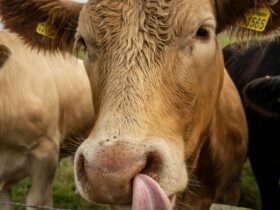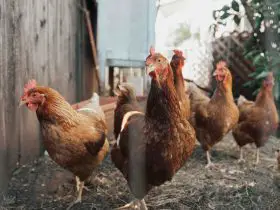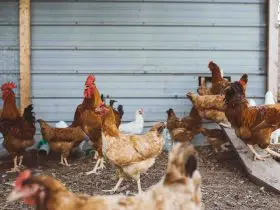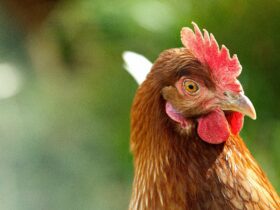Electrolytes play a vital role in maintaining proper bodily functions in goats. These essential minerals, including sodium, potassium, calcium, and magnesium, regulate hydration, nerve and muscle function, and acid-base balance. As conscientious goat owners, we strive to provide our animals optimal care. However, an important question arises: can goats be given too much electrolytes? In this article, we will delve into the significance of electrolytes for goats, examine the potential risks associated with over-supplementing, and explore the consequences of electrolyte imbalances. By understanding the delicate balance required for goats’ well-being, we can ensure the appropriate use of electrolyte supplementation and maintain the health of our beloved goats.
The Role of Electrolytes in Goats
Electrolytes play a crucial role in the overall well-being of goats by maintaining fluid balance, facilitating nerve and muscle function, and supporting essential cellular activities. These minerals, including sodium, potassium, calcium, and magnesium, are involved in numerous physiological processes necessary for goats’ optimal health.
Firstly, electrolytes help regulate fluid balance within the goat’s body. They ensure proper water distribution between cells and body compartments, which is vital for cellular function, nutrient transport, and waste elimination.
Secondly, electrolytes are essential for nerve and muscle function in goats. They enable proper nerve transmission, allowing signals to travel efficiently throughout the body. Electrolytes also contribute to muscle contractions, enabling goats to move, graze, and engage in various physical activities.
Additionally, electrolytes support cellular activities in goats. They maintain the electrical charge and pH balance within cells, crucial for cellular metabolism, enzyme function, and overall cellular health.


It’s important to note that goats require a delicate balance of electrolytes for optimal health. Any disruption in the appropriate concentration of these minerals can negatively affect their physiological processes. Too few electrolytes can lead to imbalances that adversely affect the goat’s overall well-being.
Understanding the vital role that electrolytes play in maintaining fluid balance, facilitating nerve and muscle function, and supporting cellular activity is key to ensuring the well-being of our goats. Proper electrolyte supplementation, in the right amounts and ratios, is necessary to maintain this delicate balance and promote optimal health in our goats.
Electrolyte Imbalance in Goats
Electrolyte imbalance can have significant consequences on the health of goats. An excess of electrolytes in the body can disrupt the delicate balance necessary for proper physiological functioning, leading to a range of health issues.
An excessive intake of electrolytes can disrupt the body’s delicate balance by altering the concentration of minerals in the bloodstream and body fluids. This imbalance can interfere with vital processes such as fluid regulation, nerve transmission, and muscle function.
Common symptoms and signs of electrolyte toxicity in goats can indicate an electrolyte imbalance. These may include:
1. Diarrhea or constipation: Abnormal bowel movements can be observed when goats have an electrolyte imbalance.
2. Vomiting or nausea: Excessive electrolytes can cause gastrointestinal disturbances, resulting in vomiting or feelings of nausea in goats.
3. Excessive thirst: An imbalance of electrolytes may lead to increased thirst as the body attempts to restore equilibrium.
4. Frequent urination: Electrolyte imbalances can affect kidney function, leading to increased urine production and more frequent urination.
5. Muscle weakness or tremors: Disruptions in electrolyte levels can impact muscle function, causing weakness or involuntary muscle tremors in goats.
6. Abnormal heart rhythms: Electrolyte imbalances can affect the heart’s electrical activity, resulting in irregular or abnormal heart rhythms.
7. Swollen or bloated abdomen: In some cases, electrolyte imbalances can contribute to fluid retention and bloating in goats, leading to a swollen abdomen.
8. Disorientation or confusion: Electrolyte imbalances may cause neurological symptoms such as disorientation, confusion, or changes in behavior.
Recognizing these signs and symptoms of electrolyte toxicity in goats is crucial. Prompt veterinary intervention is necessary to restore electrolyte balance and address related health issues.
Causes of Electrolyte Imbalance in Goats
Electrolyte imbalances in goats can arise from various factors, disrupting the delicate equilibrium of these essential minerals. Understanding the causes of electrolyte imbalances is crucial in preventing such issues in goats.
1. Incorrect Supplementation Practices: Improper administration of electrolyte supplements can contribute to imbalances. Giving goats excessive amounts or incorrect ratios of electrolytes can disrupt their optimal balance, leading to imbalances and potential health issues.
2. Feeding High-Electrolyte Content Feeds: Certain feeds and forages naturally contain higher electrolytes. If goats are solely or predominantly fed such feeds without careful consideration of overall electrolyte intake, it can lead to excess specific minerals and disrupt the balance.
3. Environmental Factors: Extreme weather conditions, such as excessive heat or cold, can contribute to electrolyte imbalances in goats. During hot weather, goats may lose electrolytes through excessive sweating, while cold weather may reduce water intake, affecting fluid and electrolyte balance.
4. Illness or Disease: Certain health conditions or diseases can impact electrolyte balance in goats. Diarrhea, vomiting, kidney dysfunction, and other illnesses can lead to fluid and electrolyte losses or impair the body’s ability to maintain proper balance.
5. Water Quality: Poor quality or contaminated water sources can contain high levels of certain electrolytes, leading to imbalances when consumed by goats. To avoid electrolyte disturbances, it’s important to ensure clean and properly balanced water sources for goats.
6. Intensive Exercise or Work: Goats engaged in intense physical activity or work may experience electrolyte imbalances due to increased sweating and fluid loss. In such cases, adequate hydration and electrolyte replenishment becomes essential.
Goat owners must be aware of these factors that can contribute to electrolyte imbalances in goats. Careful monitoring of supplementation practices, feed selection, environmental conditions, and overall goat health can help prevent and address electrolyte imbalances. Consultation with a veterinarian can provide valuable guidance on appropriate supplementation, feed management, and preventive measures to maintain optimal electrolyte balance in goats.

Risks and Health Issues
Over-supplementing electrolytes in goats can pose risks and lead to various health issues. Electrolyte imbalance can affect different bodily systems, including the digestive, nervous, and cardiovascular systems, resulting in significant health consequences.
1. Digestive System: Excessive electrolytes can disrupt the digestive system in goats, leading to gastrointestinal disturbances such as diarrhea, constipation, and reduced nutrient absorption. These issues can result in nutrient deficiencies and overall poor digestive health.
2. Nervous System: Electrolyte imbalances can impact the proper functioning of the nervous system in goats. Disruptions in nerve transmission can lead to muscle weakness, tremors, disorientation, confusion, and even seizures in severe cases.
3. Cardiovascular System: The delicate balance of electrolytes is crucial for maintaining a healthy cardiovascular system in goats. Imbalances can affect heart function, resulting in abnormal heart rhythms, increased heart rate, reduced cardiac output, and potential cardiovascular complications.
Examples of specific health conditions that can arise from electrolyte imbalances in goats include:
– Hyperkalemia: Excessive potassium levels can lead to hyperkalemia, which can cause muscle weakness, heart rhythm abnormalities, and cardiac arrest.
– Hyponatremia: Low sodium levels can result in hyponatremia, characterized by symptoms such as lethargy, weakness, seizures, and even coma.
– Hypocalcemia: Insufficient calcium levels can lead to hypocalcemia, also known as milk fever, a common condition in lactating goats. It can cause muscle tremors, stiffness, weak contractions during labor, and even death if not addressed promptly.
– Hypomagnesemia: Inadequate magnesium levels can result in hypomagnesemia or grass tetany, primarily affecting grazing goats. It can lead to muscle spasms, twitching, incoordination, and potentially fatal nervous system disturbances.
It is important for goat owners to be cautious about over-supplementing electrolytes and ensure that these minerals’ balance is maintained within the optimal range. Regular monitoring, appropriate supplementation practices, and consulting with a veterinarian can help mitigate the risks associated with electrolyte imbalances and promote goats’ overall health and well-being.
Preventing Electrolyte Imbalance
Maintaining proper electrolyte balance in goats is crucial for their health and well-being. It is important to implement practical advice and preventive measures to prevent electrolyte imbalances. Consulting with a veterinarian and understanding the specific needs of individual goats are essential steps in ensuring optimal electrolyte balance.
1. Consult with a Veterinarian: Seeking guidance from a veterinarian is vital in determining the appropriate electrolyte supplementation for goats. A veterinarian can assess the specific needs of your goats based on factors such as age, breed, health status, and environmental conditions.
2. Balance Electrolyte Supplementation: Follow recommended guidelines for electrolyte supplementation, ensuring the correct amounts and ratios. Avoid over-supplementing electrolytes, as it can disrupt the delicate balance and lead to imbalances or health issues.
3. Quality Feed and Forage: Provide goats with a balanced diet containing quality feed and forage. This will help ensure adequate intake of natural electrolytes and reduce the reliance on supplemental electrolytes.
4. Proper Water Management: Ensure access to clean and fresh water. Regularly monitor water quality to prevent excessive levels of electrolytes that may contribute to imbalances.
5. Environmental Considerations: Be mindful of environmental factors affecting electrolyte balance, such as extreme temperatures. Provide shelter, shade, and appropriate ventilation to minimize stress and fluid loss.
6. Individual Goat Needs: Recognize that each goat may have unique requirements for electrolyte supplementation. Age, health conditions, pregnancy, and lactation can influence their needs. Adjust supplementation accordingly based on individual requirements.
7. Regular Monitoring: Monitor goats for signs of electrolyte imbalances and seek veterinary attention if any abnormalities are observed. Regular check-ups and monitoring of electrolyte levels can help identify and address imbalances promptly.
By implementing these preventive measures and understanding the specific needs of your goats, you can help ensure proper electrolyte balance. Collaboration with a veterinarian is essential in developing an appropriate electrolyte supplementation plan tailored to your goats’ requirements. This proactive approach will improve their health, performance, and quality of life.
Can you give a goat too many electrolytes?
In conclusion, maintaining a proper electrolyte balance is essential for goats’ optimal health and well-being. Electrolytes are crucial in maintaining fluid balance, facilitating nerve and muscle function, and supporting cellular activities. It is important to recap the main points discussed in this article regarding electrolyte balance in goats.

We have explored the importance of electrolytes in goats, emphasizing their role in maintaining fluid balance, supporting nerve and muscle function, and facilitating cellular activity. Goats require a delicate balance of electrolytes to thrive and perform their physiological functions effectively.
However, over-supplementing electrolytes can lead to imbalances and pose risks to goat health. Imbalances can affect various bodily systems, including the digestive, nervous, and cardiovascular systems, leading to health issues such as gastrointestinal disturbances, muscle weakness, abnormal heart rhythms, and more.
To prevent electrolyte imbalances in goats, seeking veterinary advice and following recommended guidelines is crucial. Consulting with a veterinarian will help determine the specific needs of individual goats and develop an appropriate electrolyte supplementation plan. Additionally, providing a balanced diet, monitoring water quality, considering environmental factors, and regularly monitoring goats for signs of imbalances are important preventive measures.
Maintaining a proper balance of electrolytes is paramount for goats’ overall health, performance, and well-being. By prioritizing their electrolyte needs and following recommended guidelines, goat owners can help prevent electrolyte imbalances and associated health issues.
READ MORE:
Unveiling the Palatable Power: Can Goats Safely Savor the Delight of Persimmons in 2023?
How to Find a Lost Goat on Your Farm? Quickest 6-Step Guide
Debunking the Myth: Exploring the Truth about Goats and Egg-Laying in 2023














Hello!! Welcome to Anim Farm